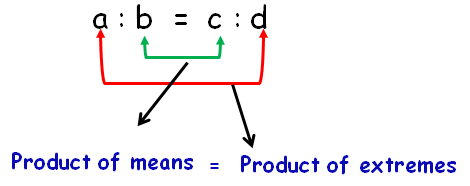CHECK IF THE GIVEN RATIOS ARE EQUIVALENT
Subscribe to our ▶️ YouTube channel 🔴 for the latest videos, updates, and tips.
A proportion is a statement that two quantities are equal.
Method 1 :
If two ratios are equal, then

Method 2 :
Multiply both parts of one of the ratio by some constant and check, we get the other ratio.
Method 3 :
Divide both parts of one of the ratio by some constant and check, we get the other ratio.
Which of the following pairs of ratios are equal?
(1) 16 : 20, 4 : 5
(2) 3 : 5, 21 : 35
(3) 2 : 7, 8 : 21
(4) 5 : 6, 30 : 36
(5) 12 : 16, 18 : 24
(6) 15 : 35, 21 : 56
(7) 18 : 27, 6 : 4
(8) 2 : 2 1/2 , 32 : 40
(9) 1 : 1 1/3, 15 : 20
(10) 4 : 6, 20 : 30
1. Solution :
16 : 20, 4 : 5
Method 1 :
16 : 20, 4 : 5
Product of extremes = 16(5) ==> 80
Product of means = 20(4) ==> 80
So, both are equal ratios.
16 : 20 ---(1)
4 : 5 ----(2)
Taking the second ratio, and multiply both parts by 4.
= 4(4) : 5(4)
We get (1),
= 16 : 20 ---(1)
Method 3 :
16 : 20
Taking the first ratio, and divide both parts by 4.
= 16/4 : 20/4
we get (2),
= 4 : 5---(2)
Note : Sometimes, we should do multiplication or division for both ratios.
2. Solution :
3 : 5, 21 : 35
= 3(7) : 5(7)
= 21 : 35
So, the given ratios are equal.
3. Solution :
2 : 7, 8 : 21
Product of extremes = Product of means
7(21) = 7(8)
147 ≠ 56
So, the given ratios are not equal.
4. Solution :
5 : 6, 30 : 36
Multiplying both parts of the first ratio by 6, we get
= 5(6) : 6(6)
= 30 : 36
We get the second ratio. So, they are equal ratios.
5. Solution :
12 : 16, 18 : 24
Divide the first ratio by 4, so we get
12/4 : 16/4 ==> 3 : 4
Divide the second ratio by 6, so we get
18/6 : 24/6 ==> 3 : 4
So, both are equal ratios.
6. Solution :
15 : 35, 21 : 56
Divide the first ratio by 5, so we get
15/5 : 35/5 ==> 3 : 7
Divide the second ratio by 7, so we get
21/7 : 56/7 ==> 3 : 8
So, they are not equal ratios.
7. Solution :
18 : 27, 6 : 4
Divide the first ratio by 9, so we get
18/9 : 27/9 ==> 2 : 3
Divide the second ratio by 2, so we get
6/2 : 4/2 ==> 3 : 2
So, they are not equal ratios.
8. Solution :
2 : 2 1/2 , 32 : 40
Let us change the mixed fraction into improper fraction.
2 : 2 1/2 ==> 2 : 5/2
Multiplying both parts by 2, we get
4 : 5
Divide both parts of the second ratio 32 : 40 by 8
= 32/8 : 40/8
= 4 : 5
We get the same answers. So, they are equal ratios.
9. Solution :
1 : 1 1/3 ==> 1 : 4/3
Multiplying both parts by 3, we get
3 : 4
Divide both parts of the second ratio 15 : 20 by 5, we get
= 15/5 : 20/5
= 3 : 4
So, they are equal ratios.
10. Solution :
4 : 6, 20 : 30
Product of extremes = 4(30) ==> 120
Product of means = 6(20) ==> 120
So, the given ratios are equal ratios.
Subscribe to our ▶️ YouTube channel 🔴 for the latest videos, updates, and tips.
Kindly mail your feedback to v4formath@gmail.com
We always appreciate your feedback.
About Us | Contact Us | Privacy Policy
©All rights reserved. onlinemath4all.com

Recent Articles
-
Digital SAT Math Problems and Solutions (Part - 23)
Feb 27, 26 04:01 AM
Digital SAT Math Problems and Solutions (Part - 23) -
Digital SAT Math Problems and Solutions (Part - 22)
Feb 26, 26 08:43 PM
Digital SAT Math Problems and Solutions (Part - 22) -
10 Tricky SAT Math Questions with Answers
Feb 25, 26 08:07 AM
10 Tricky SAT Math Questions with Answers

